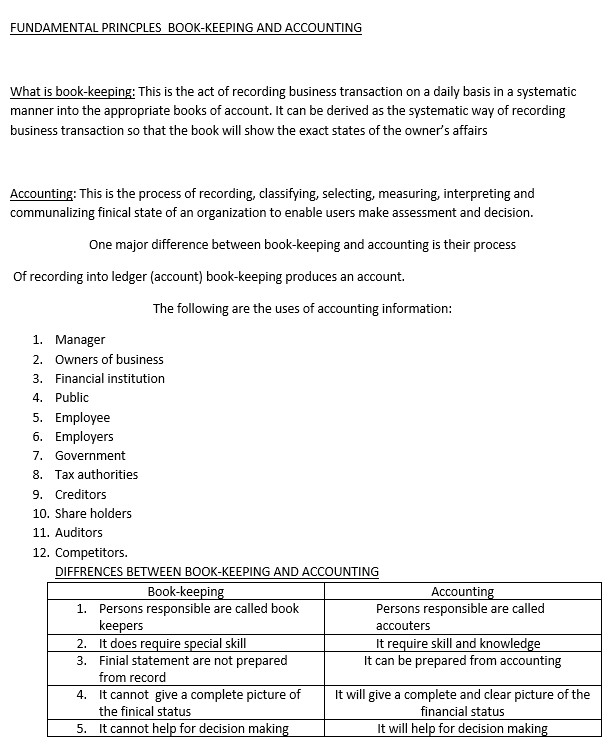Bookkeeping and Accounting
Summary:
Bookkeeping is the systematic process of recording daily business transactions, providing a clear view of the financial state of affairs. Accounting, on the other hand, involves the recording, classifying, interpreting and communicating of an organization’s financial state to allow users to make informed decisions. Both bookkeeping and accounting are critical, though accounting is more comprehensive and requires specialized skills and knowledge. Accounting information is vital for stakeholders like managers, business owners, financial institutions, employees, the government, and competitors, among others. The history of accounting traces back to the Babylonian and Assyrian civilizations, with modern methods like the double-entry system introduced by Luca Paciolo in 1494. In Nigeria, the accounting profession is regulated by bodies like the Institute of Charted Accountants of Nigeria (ICAN) and the Association of National Accountants of Nigeria (ANAN). The importance of bookkeeping and accounting lies in their ability to determine the financial position of a business, facilitate decision-making, determine profit or loss, prevent fraudulent practices, and facilitate tax assessment. Lastly, accounting ethics, characterized by transparency, honesty, fairness, and objectivity, are crucial in maintaining trust and professionalism in the field. The fundamental accounting equation, Assets=Capital+Liability, forms the basis of double-entry accounting.
Excerpt:
Bookkeeping and Accounting
FUNDAMENTAL PRINCIPLES OF BOOKKEEPING AND ACCOUNTING
What is bookkeeping: This is the act of recording business transactions on a daily basis systematically into the appropriate books of account. It can be derived as the systematic way of recording business transactions so that the book will show the exact state of the owner’s affairs.
Accounting: This is the process of recording, classifying, selecting, measuring, interpreting and communalizing finical state of an organization to enable users to make assessments and decisions.
One major difference between bookkeeping and accounting is their recording process into a ledger (account); bookkeeping produces an account.
The following are the uses of accounting information:
- Manager
- Owners of business
- Financial institution
- Public
- Employee
- Employers
- Government
- Tax authorities
- Creditors
- Shareholders
- Auditors
- Competitors


Reviews